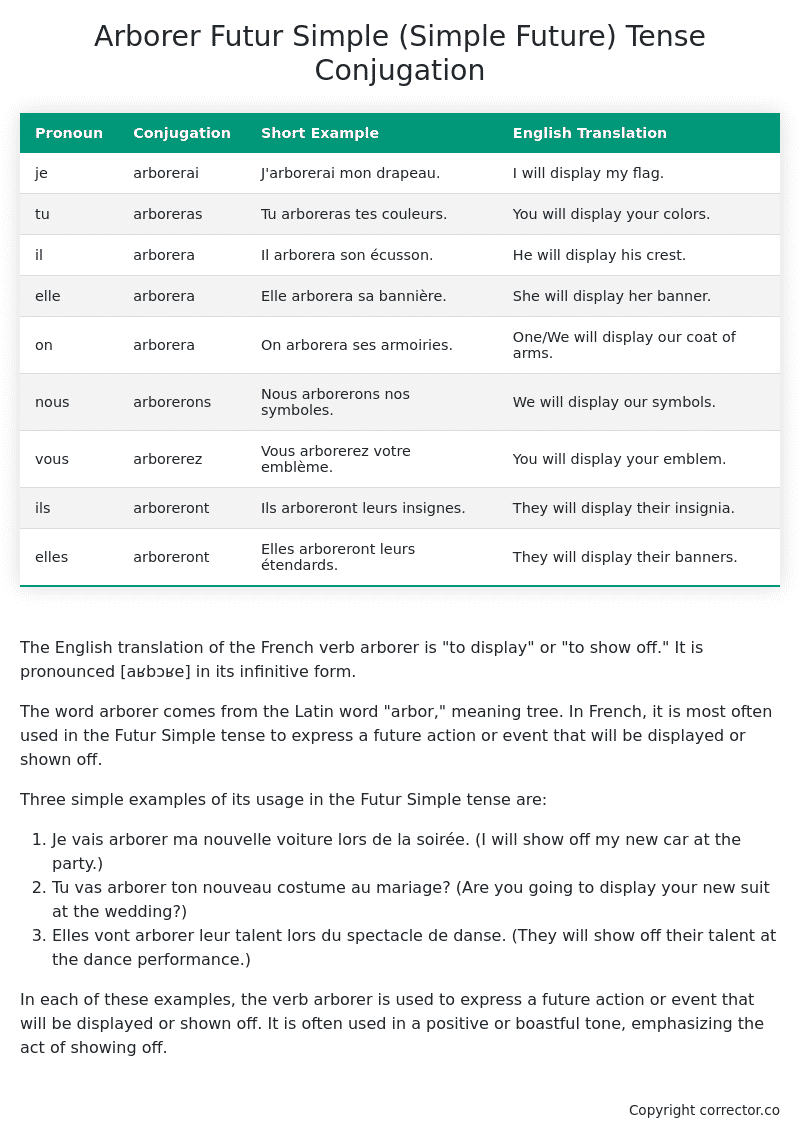Futur Simple (Simple Future) Tense Conjugation of the French Verb arborer
Introduction to the verb arborer
The English translation of the French verb arborer is “to display” or “to show off.” It is pronounced [aʁbɔʁe] in its infinitive form.
The word arborer comes from the Latin word “arbor,” meaning tree. In French, it is most often used in the Futur Simple tense to express a future action or event that will be displayed or shown off.
Three simple examples of its usage in the Futur Simple tense are:
- Je vais arborer ma nouvelle voiture lors de la soirée. (I will show off my new car at the party.)
- Tu vas arborer ton nouveau costume au mariage? (Are you going to display your new suit at the wedding?)
- Elles vont arborer leur talent lors du spectacle de danse. (They will show off their talent at the dance performance.)
In each of these examples, the verb arborer is used to express a future action or event that will be displayed or shown off. It is often used in a positive or boastful tone, emphasizing the act of showing off.
Table of the Futur Simple (Simple Future) Tense Conjugation of arborer
| Pronoun | Conjugation | Short Example | English Translation |
|---|---|---|---|
| je | arborerai | J’arborerai mon drapeau. | I will display my flag. |
| tu | arboreras | Tu arboreras tes couleurs. | You will display your colors. |
| il | arborera | Il arborera son écusson. | He will display his crest. |
| elle | arborera | Elle arborera sa bannière. | She will display her banner. |
| on | arborera | On arborera ses armoiries. | One/We will display our coat of arms. |
| nous | arborerons | Nous arborerons nos symboles. | We will display our symbols. |
| vous | arborerez | Vous arborerez votre emblème. | You will display your emblem. |
| ils | arboreront | Ils arboreront leurs insignes. | They will display their insignia. |
| elles | arboreront | Elles arboreront leurs étendards. | They will display their banners. |
Other Conjugations for Arborer.
Le Present (Present Tense) Conjugation of the French Verb arborer
Imparfait (Imperfect) Tense Conjugation of the French Verb arborer
Passé Simple (Simple Past) Tense Conjugation of the French Verb arborer
Passé Composé (Present Perfect) Tense Conjugation of the French Verb arborer
Futur Simple (Simple Future) Tense Conjugation of the French Verb arborer (this article)
Futur Proche (Near Future) Tense Conjugation of the French Verb arborer
Plus-que-parfait (Pluperfect) Tense Conjugation of the French Verb arborer
Passé Antérieur (Past Anterior) Tense Conjugation of the French Verb arborer
Futur Antérieur (Future Anterior) Tense Conjugation of the French Verb arborer
Subjonctif Présent (Subjunctive Present) Tense Conjugation of the French Verb arborer
Subjonctif Passé (Subjunctive Past) Tense Conjugation of the French Verb arborer
Subjonctif Imparfait (Subjunctive Imperfect) Tense Conjugation of the French Verb arborer
Subjonctif Plus-que-parfait (Subjunctive Pluperfect) Tense Conjugation of the French Verb arborer
Conditionnel Présent (Conditional Present) Tense Conjugation of the French Verb arborer
Conditionnel Passé (Conditional Past) Tense Conjugation of the French Verb arborer
L’impératif Présent (Imperative Present) Tense Conjugation of the French Verb arborer
L’infinitif Présent (Infinitive Present) Tense Conjugation of the French Verb arborer
Struggling with French verbs or the language in general? Why not use our free French Grammar Checker – no registration required!
Get a FREE Download Study Sheet of this Conjugation 🔥
Simply right click the image below, click “save image” and get your free reference for the arborer Futur Simple tense conjugation!

Arborer – About the French Futur Simple (Simple Future) Tense
Formation of Futur Simple
For regular -er verbs (e.g., parler – to speak)
For regular -ir verbs (e.g., finir – to finish)
For regular -re verbs (e.g., vendre – to sell)
Common Everyday Usage Patterns
Conditional Statements
Interactions with Other Tenses
Futur Antérieur
Conditional
Present
Summary
I hope you enjoyed this article on the verb arborer. Still in a learning mood? Check out another TOTALLY random French verb conjugation!


